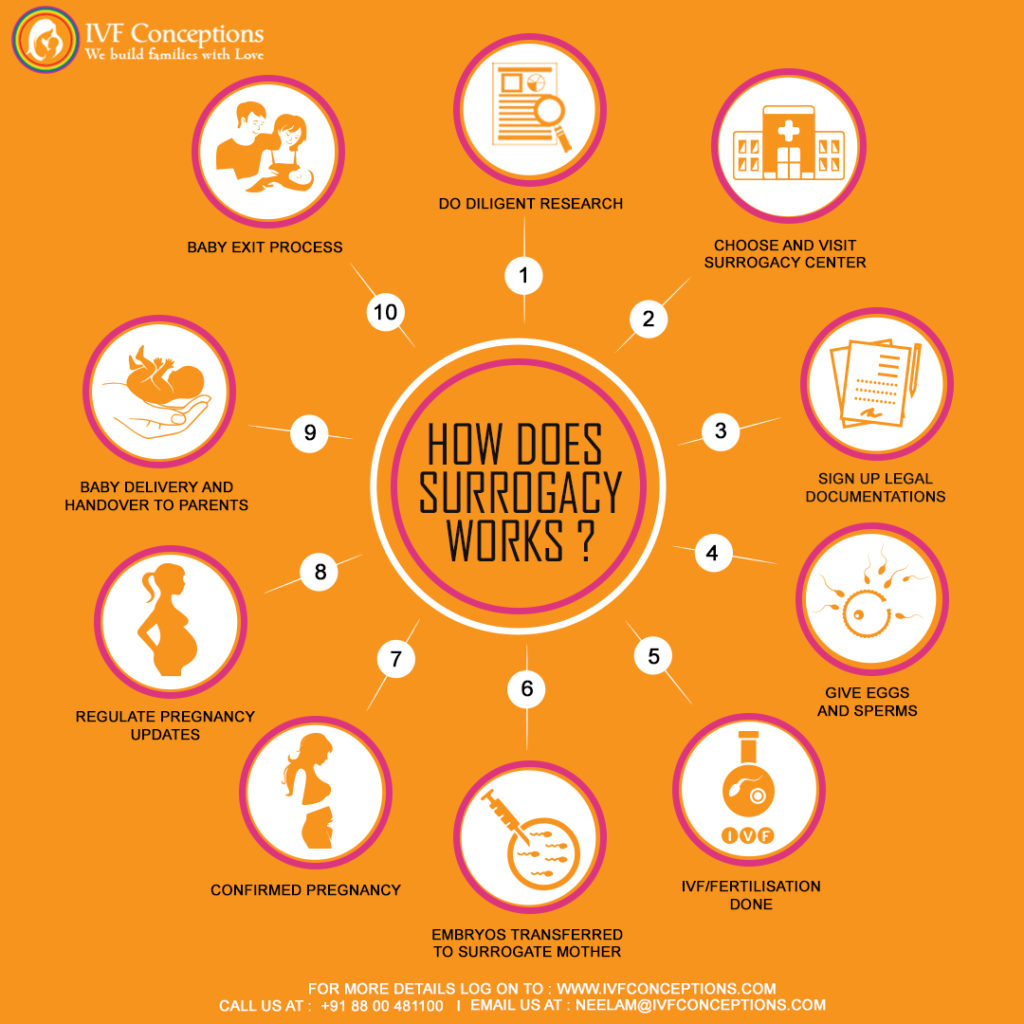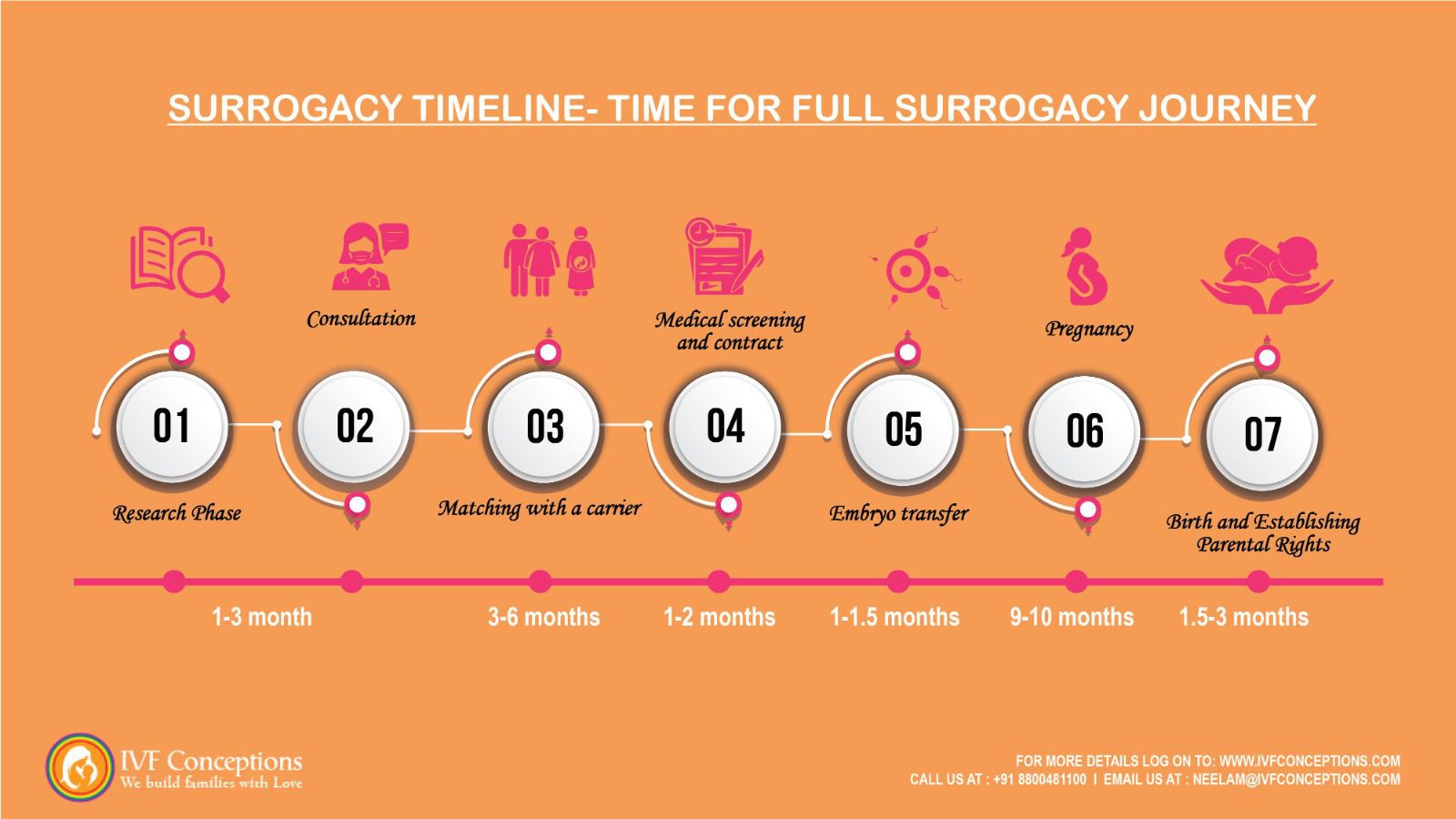How Long Does Surrogacy Take: Navigating the Surrogacy Timeline

A typical surrogacy Timeline varies from 1.5 years to 2 years for a complete surrogacy process from start to end. Surrogacy is a life-changing journey that involves intended parents and surrogate mothers coming together to bring a precious life into the world. However, many individuals embarking on this path often wonder about the timeline of the surrogacy process. How long does it take from the moment you decide to pursue surrogacy to the moment you hold your baby in your arms? Let’s explore the surrogacy timeline and shed some light on the various stages involved in this remarkable journey.
Understanding the Intended Parent Timeline
For intended parents, the surrogacy timeline can vary based on several factors. On average, the entire process typically spans between 18 to 24 months, from the initial application to the birth of your baby. However, it’s important to note that each step within this timeline comes with its own estimated duration. Let’s delve into the key milestones along the way:
- Free Consultation & Sign On (1 Week): To begin your surrogacy journey, it’s advisable to schedule a complimentary consultation with a reputable surrogacy agency like Reproductive Possibilities. During this week, you’ll meet with the agency’s team, including the founder or a member of the management team, and an Intended Parent Coordinator. They will guide you through the surrogacy process, answer your questions, and provide detailed information.
- Matching with a Surrogate (10-14 Months): After signing on with a surrogacy agency, the process of finding a suitable surrogate begins. The duration of this stage depends on various factors, such as your criteria and the availability of compatible surrogates. If your preferences are more flexible, the matching process may be expedited, potentially taking around 10 to 14 months. However, if you have specific criteria or preferences, it may take longer to find the perfect match.
- Drafting and Negotiating Contracts (2-3 Weeks): Once a match is found, the next step involves drafting and negotiating the gestational carrier contracts. This crucial process ensures that all parties involved have a clear understanding of their rights, responsibilities, and expectations. Finalizing these contracts typically takes approximately 2 to 3 weeks.
- Embryo Transfer Cycle (4-5 Weeks): After the contracts are successfully negotiated and signed, the clinic can initiate the embryo transfer cycle. During this phase, your surrogate will begin taking medications to prepare her body for embryo transfer. Generally, the transfer itself occurs within 4 to 5 weeks from the start of your surrogate’s medication protocol.
- Pregnancy and Delivery (Approximately 9 Months): If the first embryo transfer is successful, you can expect the incredible journey of pregnancy to commence. The average duration of a pregnancy, whether through surrogacy or naturally, is around 9 months. Thus, if all goes well, you will be welcoming your baby into the world at the end of this period.

Understanding the Surrogate Timeline
The surrogacy process takes 18 months to 24 months depending upon the individual circumstances
Outlines the surrogacy process timeline for gay intended parents:
|
Stage |
Description of Stage |
Duration |
|
Research Phase |
Explore family-building options and decide on surrogacy. |
Personal timeframe |
|
Consultation and Application |
Choose a surrogacy agency, sign an agreement, and start embryo creation (if needed). |
1-3 Months |
|
Matching |
The agency finds and presents potential gestational carriers. Meet and decide on a match. |
3-6 Months |
|
Medical Screening and Contracts |
Carrier undergoes medical and psychological screening. Sign a surrogacy contract. |
1-2 Months |
|
Embryo Transfer |
Prepare for embryo transfer. Success may take multiple attempts. |
1-1.5 Months |
|
Pregnancy |
Gestational carrier’s pregnancy, approximately 40 weeks. |
9-10 Months |
|
Birth and Postpartum |
Baby’s birth, establish parental rights, and the postpartum period. |
1.5-3 Months |
Please keep in mind that the durations mentioned in the table are approximate and can vary depending on individual circumstances and other factors. Always consult with a reputable surrogacy agency or professional to get personalized guidance throughout the surrogacy journey.
For women aspiring to become surrogate mothers, understanding the surrogacy timeline is equally crucial. The duration of the surrogacy process for surrogates can also vary depending on several factors. On average, the timeline spans approximately 14 to 22 months, encompassing various stages from application to delivery. Let’s explore the key steps along the surrogate timeline:
- Application & Initial Screening (1-3 Weeks): As a prospective surrogate, you’ll need to complete the application process, which typically takes 1 to 3 weeks. This involves filling out forms and providing the necessary information. Once your application is submitted, the agency will review it and schedule a full interview to further assess your suitability for surrogacy.
- Gathering Information and Medical Records (3-6 Weeks): After the initial screening, the agency will gather additional information from you, including medical records, forms, and background documents. This process usually takes around 3 to 6 weeks. The agency will also share your profile with intended parents who align with your criteria to facilitate the matching process.
- Matching with Intended Parents (2-4 Weeks): Once your profile is shared with intended parents, the agency aims to find the right match for you within 2 to 4 weeks. Matching involves assessing compatibility based on various factors, such as preferences, expectations, and personal values.
- Embryo Transfer (6-8 Weeks): After the matching process, if the intended parents have viable embryos ready for transfer, the medical procedures can move forward. The embryo transfer typically occurs within 6 to 8 weeks after the match. In case the first transfer is unsuccessful, subsequent transfers may require another 6 to 8 weeks to be scheduled.
- Pregnancy and Delivery: Once the embryo transfer is successful, the surrogate mother embarks on the extraordinary journey of carrying the intended parents’ baby to term. The duration of pregnancy, as mentioned earlier, is approximately 9 months. At the end of this period, the surrogate mother gives birth, making the dreams of the intended parents come true.
More resources for Surrogacy Timeline:
- 13 Factors for Choosing A Right Surrogacy Agency
- Low-Cost Surrogacy Options Globally
- How Egg Freezing Can Help Cancer Patients
- Understanding PCOD and its impact on fertility: What every woman should know
- Relationship between Diabetes and Infertility
Tips for a Positive Surrogacy Journey
Embarking on a surrogacy journey, whether as an intended parent or surrogate mother, can be a mix of emotions, challenges, and triumphs. To ensure a positive experience, it’s essential to prepare yourself and seek support along the way. Here are some valuable tips for a positive surrogacy journey:
- Be Prepared: Take your time to read, research, and ask questions. Familiarize yourself with other people’s stories, blogs, forums, and resources that provide insights into surrogacy. Understand the counseling and legal processes involved. Attend events where you can meet people at different stages of the journey. This will help you gain a comprehensive understanding of surrogacy.
- Consult with a Surrogacy Counsellor: Seeking guidance from an experienced surrogacy counselor can be immensely beneficial. They can provide emotional support, help you navigate the complexities of the journey, and prepare you for the emotional challenges you may encounter along the way.
- Build a Support Network: Surround yourself with a strong support network that includes family, friends, and others who have experience with surrogacy. Connecting with individuals who understand and have gone through similar experiences can provide invaluable support and advice.\
- Open Communication: Maintain open and honest communication with the intended parents or surrogate mother throughout the journey. Clear and transparent communication helps build trust, ensures everyone is on the same page, and minimizes misunderstandings or conflicts that may arise.
- Seek Legal Advice: Consult with a legal professional who specializes in surrogacy to ensure that all legal aspects are handled appropriately. This includes drafting surrogacy agreements, understanding parental rights, and navigating the legal processes of establishing parentage.
- Self-Care: Prioritize self-care and well-being throughout the surrogacy journey. Take time to engage in activities that bring you joy, reduce stress, and help you maintain a positive mindset. Remember to address your physical, emotional, and mental needs to ensure a healthy and fulfilling experience.
- Stay Informed: Keep yourself updated on the latest advancements, legal regulations, and best practices in the field of surrogacy. This knowledge will empower you to make informed decisions and adapt to any changes that may arise during your journey.
- Celebrate Milestones: Acknowledge and celebrate the significant milestones along the surrogacy journey. Whether it’s the successful embryo transfer, positive medical check-ups, or reaching each trimester of pregnancy, these milestones signify progress and bring hope and joy to all involved.
Factors Influencing Surrogacy Duration
The duration of the surrogacy process can vary depending on several factors, including:
– Legal requirements and processes in the intended parents’ jurisdiction
– Availability of suitable surrogates
– Medical factors, such as the success of IVF procedures and the surrogate’s pregnancy experience

More surrogacy guides:
How Does Surrogacy Process Work- 7 Easy-to-Follow Surrogacy Steps
How Much Does Surrogacy Cost? Everything You Need To Know (in 2024)
How to Start the Gestational Surrogacy Process? A step-by-step guide for Beginners
Commercial Surrogacy: Complete Guide, Costs, Process & Legalities
Conclusion
|
Step |
Description |
Duration/Timeframe |
|
Research Surrogacy |
Learn about surrogacy and its benefits. |
Varies based on individual readiness and research. |
|
Plan for a Surrogacy Journey |
Understand your starting point, set expectations, and create a custom roadmap. |
Varies based on individual preparation. |
|
Match With A Surrogate |
Retain ConceiveAbilities to recruit and match you with a surrogate. |
Varies based on surrogate availability. |
|
Begin Pregnancy |
Surrogate undergoes medical clearance and embryo transfer takes place. |
Time needed for medical procedures. |
|
Prepare for Your Baby’s Arrival |
The surrogate’s obstetrician takes over medical care, and a birth plan is created. |
During the middle of the surrogate’s pregnancy. |
|
Conclude Your Surrogacy Journey |
Support for the surrogate post-pregnancy, settling financial matters, and considering future journeys. |
Post-pregnancy period and individual decisions. |
Remember, every surrogacy journey is unique, and the timelines and experiences can vary. By being prepared, seeking support, and maintaining a positive mindset, you can navigate the surrogacy timeline with confidence and create a memorable and rewarding journey for everyone involved.
Surrogacy is often a long and complicated process, with several legal and medical requirements. However, the process is worth it for parents who want to start or expand their families. It is crucial to understand the timeline involved and to seek appropriate support throughout the process.
If you’d like to learn more about IVF, Egg Donation, or surrogacy services globally, check out the rest of our website at IVF Conceptions. We offer legally secure and affordable surrogacy consulting services for FREE.
Our team has over 13 years of experience facilitating surrogacy arrangements, egg donation, and serving as an advocacy resource for infertile couples and LGBTQ individuals seeking to build families.
Our founder and chief surrogacy consultant, Neelam Chhagani, passionately helps couples struggling with fertility challenges. Since starting our surrogacy consulting agency in 2013, we’ve helped welcome over 500 babies for intended parents nationwide.
Our team includes experts from diverse backgrounds with leading reproductive attorneys, professionally trained top fertility doctors, former surrogacy case managers, experienced and kind surrogate mother and egg donor coordinators, mental health professionals specializing in infertility counseling, and a logistic support team to assist you in your chosen surrogacy country.

FAQs about How Long Does Surrogacy Process Takes
The surrogacy process typically takes around 15 to 18 months from start to finish.
The IVF process for surrogacy usually takes a few weeks, including egg retrieval, fertilization, and embryo transfer.
The time duration of the surrogacy process can be influenced by various factors. While it is important to note that specific timelines may vary depending on individual circumstances and legal requirements.
Reference used:

